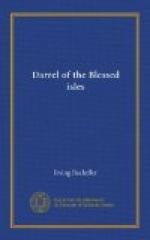“‘Go and see him—it is old Santa Claus,’ said Polly, her voice trembling as she led the child.
“Then, quickly, she took the hand of her husband.
“‘He is your father,’ she whispered.
“A moment they stood with hearts full, looking at Santa Claus and the child. That little one had her arms about a knee, and, dumb with great wonder, gazed up at him. There was a timid appeal in her sweet face.
“The man did not move; he was looking down at the child. In a moment she began to prattle and tug at him. They saw his knees bend a bit. Ah, sir, it seemed as if the baby were pulling him down. He gently pushed the child away. They heard a little cry—a kind of a wailing ’Oh-o-o,’—like that you hear in the chimney. Then, sir, down he went in his tracks—a quivering little heap,—and lay there at the foot of the tree. Polly and Trove were bending over him. Cap and wig had fallen from his head. He was an old man.
“‘Father!’ Trove whispered, touching the long white hair. ’O my father! speak to me. Let me—let me see your face.’
“Slowly—slowly, the old man rose, Trove helping him, and put on his cap. Then, sir, he took a step back and stood straight as a king. He waved them away with his hand.
“‘Nay, boy, remember,’ he whispered. ‘Ye were to let him pass.’ And then he started for the door.
“Trove went before him and stood against it.
“’Hear me, boy, ’tis better that ye let him sleep until the trumpet calls an’ ye both stand with all the quick an’ the dead.’
“‘No, I have waited long, and I love—I love him,’ Trove answered.
“Those fair young people knelt beside the old man, clinging to his hands.
“The good saint was crying.
“‘I came not here to bring shame,’ said he presently.
“‘We honour and with all our souls we love you,’ Trove answered.
“‘Who shall stand before it?’ said the old man. ’Behold—behold how Love hath raised the dead!’ He flung off his cap and beard.
“’If ye will have it so, know ye that I—Roderick Darrel—am thy father.’”
“Now, sir, you may go. I wish ye merry Christmas!” said that old man of the hills.
But the other tarried, thoughtfully puffing his pipe.
“And the father was not dead?”
“’Twas only the living death,” said the old man, now lighting a lantern. “You know that grave in a poem of Sidney Trove:
’It has neither sod nor stone;
It has neither dust nor bone.’
He planned to be as one dead to the world.”
“And the other man of mystery—who was he?”
“Some child of misfortune. He was befriended by the tinker and did errands for him.”
“He took the money to Trove that night the latter slept in the woods?”
“And, for Darrel, returned to Thompson his own with usury. Thompson was the chief creditor.”




